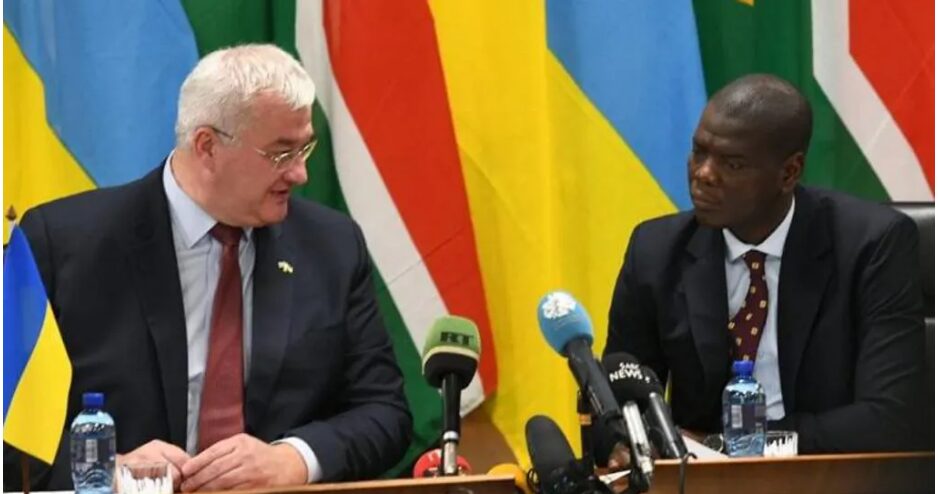‘Sorry sir, this is not Ukraine! This is not where you can suppress freedom of speech and the press,’ this is what a South African official told the visiting foreign minister of Ukraine Andrey Sibiga. What a huge embarrassment! Let’s know more.
Sibiga is on a tour of African nations. His agenda: To shore up support for Ukraine. He wants the bloc BRICS to put pressure on Russia. He has already visited Oman, Angola and Egypt before landing in Pretoria.
But when Sibiga entered a room for a press conference in the South African capital, he almost felt a panic attack after spotting a microphone of Russia Today (RT), Russia’s state news broadcaster. Sibiga was not alone in the room. He was accompanied by South African Foreign Minister Ronald Lamola.
This is where the press conference became awkward.
Sibiga immediately tried to remove the RT’s microphone from the podium. But he was immediately stopped by a South African official.
The official told Sibiga: “We can’t chase them away.” It was a gentle reminder to the minister that he is not sitting inside Ukraine. In fact, it was the free land of South Africa where freedom of speech and the press is guaranteed.
A fearful Sibiga then tried to cover the RT’s microphone with a pamphlet, which read: “Crimea is ours.”
Even when the press conference got over, Sibiga kept looking for RT’s crew and ensured he remained out of the access area.
Here’s a lesson for the foreign minister: At least pretend to be a supporter of free speech, at least on foreign land. Don’t make it too obvious. You are there to impress your hosts, who just came back from the BRICS Summit in Russia by the way.
South Africa will chair the G20 summit the next year. Sibiga is supposed to lobby Pretoria to make the upcoming G20 summit less painful for his war-torn country. And still you choose to openly threaten press crew at a joint media conference. That’s embarrassing!
But mind you! We are not surprised. According to a report by The Reporters Without Borders or RSF, the Zelensky regime has carried out a ruthless purge campaign to eliminate free press.
For instance, Ukraine jailed and prosecuted five journalists because they exposed the rampant corruption inside his government.
In one case, a journalist named Yuriy Nikolov was told that he would be forcibly enlisted into the army because of one of his stories exposing a businessman.
In fact, on June 12, a military decree said that quotes and interviews with members of the armed forces must be sent three days before publication to the centre for strategic military communications. Simply put, now the government will censor and control the speech of armed forces. It was done to ensure that no soldier is able to expose the reality on the ground and the façade of the Zelensky regime.
Needless to say, RT has already been banned in Ukraine. And just this week, RT’s Telegram account was also blocked for alleged “violation of local laws.”
Kiev and the EU have banned multiple Russian media outlets, including RT and Sputnik. In September, US tech giant Meta, which owns Facebook and Instagram, banned several Russian networks, including RT, from its platforms.
It’s clear: Muzzling critical voices is in the DNA of the Zelensky regime. But they are bad actors too, who don’t even know how to pretend!
